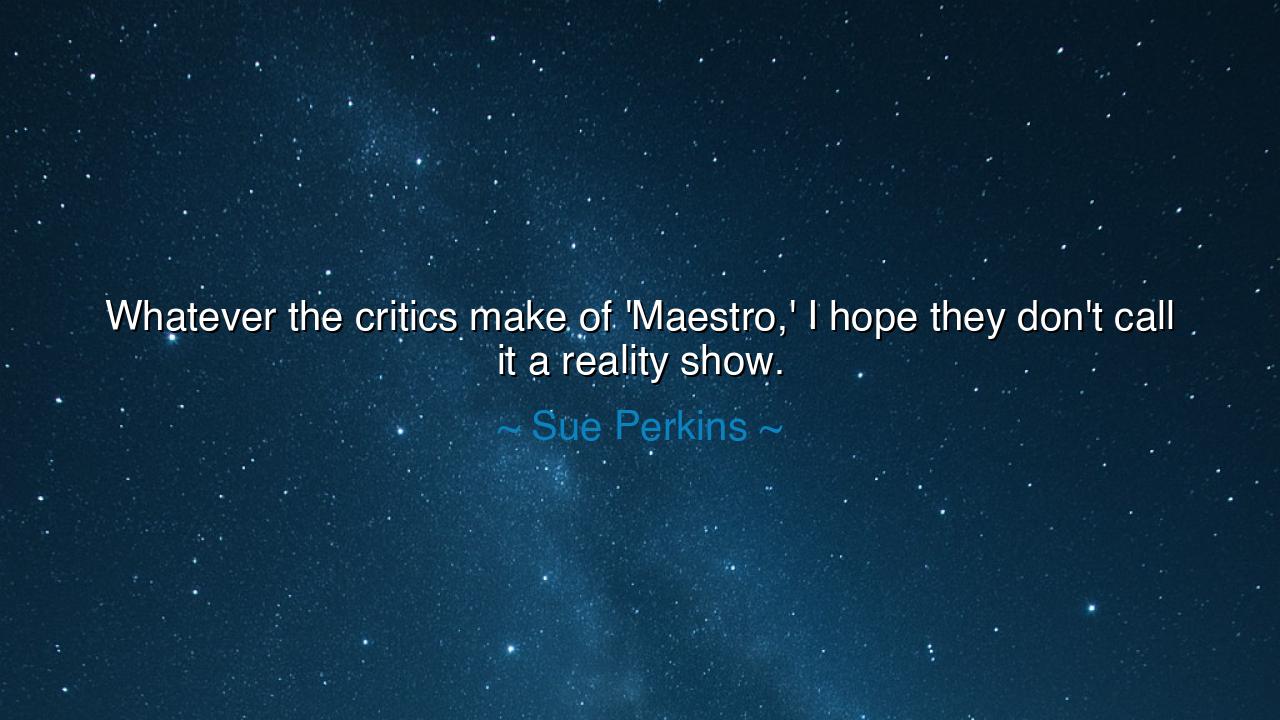
Whatever the critics make of 'Maestro,' I hope they don't call it






“Whatever the critics make of ‘Maestro,’ I hope they don’t call it a reality show.” Thus spoke Sue Perkins, a woman of wit and sincerity, whose life in the public eye has taught her the fragile balance between art and entertainment, between reality and authenticity. In these words, she gives voice to a truth that echoes far beyond the world of television—that creation, when born from passion and purpose, should not be reduced to spectacle. Her statement, though delivered in modern jest, carries an ancient weight: the defense of art as a sacred act, and the warning that when the spirit of creation is treated as mere amusement, something divine is lost.
The origin of this quote lies in the making of Maestro, a BBC program where celebrities learned the craft of conducting orchestras. Yet Sue Perkins’ plea was not for herself, nor for fame, but for the dignity of the art form she sought to honor. She feared that critics—those quick to judge and eager to categorize—would mistake genuine effort and reverence for mere performance. Her wish, then, was simple yet profound: that Maestro not be labeled a “reality show,” for that term has come to mean spectacle without soul, noise without meaning, the stage where vanity plays and truth hides behind editing. In her heart, she wished to preserve the sanctity of the music, the discipline, and the human striving that such an art demands.
In the ancient world, philosophers and poets would have understood her lament well. Plato himself, though suspicious of art’s illusions, spoke often of the sacred duty of the artist—to reflect truth, not mere imitation. He warned that when art becomes entertainment, it loses its moral force and becomes a shadow of reality. Similarly, the Greek tragedians, such as Sophocles and Euripides, believed that drama must reveal the soul of man, not merely distract him. Sue Perkins’ cry across the ages is thus the same: that art should elevate, not exploit; that it should teach us to listen, not to gawk. For to mistake the pursuit of beauty for spectacle is to dishonor both the artist and the art.
The story of Leonardo da Vinci offers a fitting example. When he painted The Last Supper, he did not seek applause or notoriety; his purpose was devotion—to capture in color and form the mystery of faith and betrayal. Yet centuries later, countless reproductions, parodies, and trivial imitations have turned his masterpiece into a mere image, consumed and forgotten. Leonardo’s sacred vision has become, for many, another ornament of popular culture—his reality transformed into entertainment. This is what Sue Perkins feared: that noble effort, when filtered through the lens of spectacle, becomes hollow. That art, stripped of intention, becomes content, and creators become performers in a theater of distraction.
Yet her words also carry hope. For in speaking them, she asserts that meaning still matters—that truth, once spoken sincerely, can still resist the machinery of fame. She reminds us that every creator, whether artist, teacher, or craftsman, must guard the integrity of their work. In a world that applauds the loudest voice rather than the truest one, authenticity is a rare and precious courage. Sue Perkins did not wish to be celebrated for appearing on a screen; she wished to be remembered for learning, for discipline, for love of the music itself. Her humility is the mark of the true artist—one who seeks not applause, but understanding.
This message stretches beyond the realm of art into every corner of life. Too often we are tempted to perform, to live as though being watched, to trade authenticity for approval. We curate our lives into spectacles, forgetting that the deepest truths are lived quietly. In this way, modern life itself becomes a “reality show”—grand, noisy, and hollow. But Sue Perkins’ wisdom calls us back to the ancient ideal: to live genuinely, to work earnestly, and to value substance over show. For what is life, if not the greatest performance of all—and what greater tragedy than to play it falsely?
So, my friends, let this be your lesson: whatever your craft, let it be real. Do not allow your work to be cheapened by those who cannot see its soul. Whether you write, build, teach, or love, do so with the sincerity of one who serves something greater than the crowd’s applause. Let your actions sing with meaning, as a symphony sings under the hand of a conductor who feels every note. For as Sue Perkins teaches, the value of what we create lies not in its spectacle, but in its truth—and truth, once born of passion, is never entertainment; it is eternity.
And thus, her words echo like a moral from the ancients: guard the sacred flame of your purpose. Do not live to be watched—live to be worthy. Let your life be a masterpiece of intention, not a “reality show” for the passing eyes of the world. For applause fades, but authenticity endures. And when time has washed away the noise and the vanity, what will remain—like the music she sought to conduct—is the quiet, resonant beauty of a life lived in truth.






AAdministratorAdministrator
Welcome, honored guests. Please leave a comment, we will respond soon